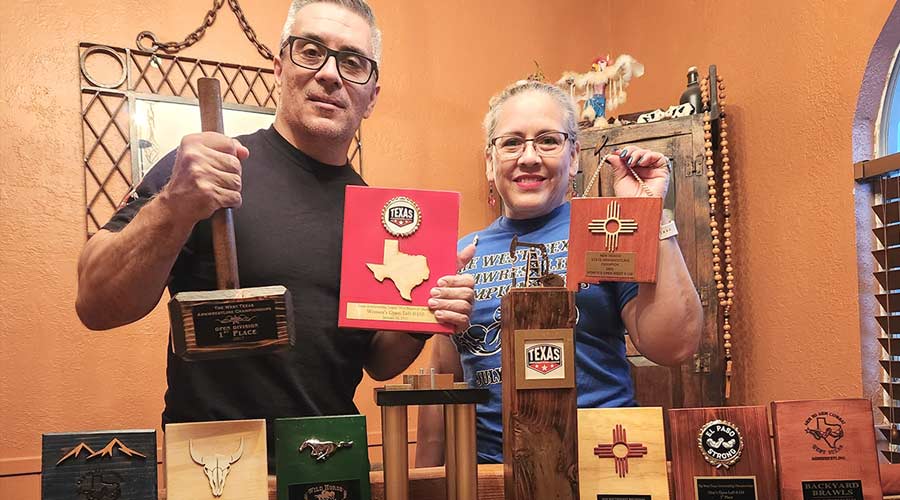
Elizamarie Perez specializes in support. During the day, she focuses on servicing contract cleaning professionals in her sales role at El Paso, Texas-based 3rd Gen LLC — Triple-S Janitorial Supplies. Outside of the office, Elizamarie thrives as an enthusiastic supporter of her husband in his quest for arm wrestling glory.
While her husband Marc is an arm-wrestling aficionado, competitor and leader, Elizamarie is more than just a cheerleader. Her role has evolved into her inadvertently becoming a partner in organizing, hosting and scoring arm wrestling tournaments put on by West Texas Armsports, a non-profit organization that Marc leads. The husband/wife duo even makes the one-of-a-kind trophies for the tournaments.
This support for the sport didn’t happen overnight, however. Marc began competing in arm wrestling in 1986, but then took a long break. It wasn’t until 2010 that he got the itch to start back up again, with Elizamarie at his side.
“My only thought was, ‘I hope he doesn’t break an arm,'” she says. “He competed for about a year before starting a tournament in El Paso. This year marks the 10th annual tournament, held every July.”
Arm wrestling started around 2000 B.C. and had a competitive resurgence in the U.S. in the 1950s. It’s international, inclusive and fosters a strong sense of camaraderie among the sport’s participants — even if they are competitors. Elizamarie experienced this firsthand when she hosted a group of arm-wrestling enthusiasts visiting from Poland.
“They were in New Mexico last year on a business trip and learned about our West Texas Armsports group,” she recalls. “They asked if they could come over and practice arm wrestling with our guys. So, there we were with our local team and seven visitors from Poland in our two-car garage — which has been converted into an arm-wrestling gym — and it was surreal. They came back again this summer for another round of practice and camaraderie.”
The West Texas Armsports team practices every Thursday in the Perez’s garage. While Elizamarie is happy to support the team in any way, she doesn’t personally arm wrestle.
“We were at a tournament in New Mexico and there was a 10-year-old girl who was scary because she was so strong and so good at arm wrestling,” Elizamarie recalls. “I jokingly told her that she’s the reason I decided not to pursue the sport myself.”
The tournaments are well-organized, with referees, strict regulations and high-tech scoring practices. Elizamarie comments that she remembers the days of scoring with paper brackets, but much prefers the computerized versions used today that are now entered into the national database.
She explains that there are usually two groups of two arm wrestlers competing at the same time. The tables that are used must meet certain standards, including height and width, and each participant uses elbow pads.
“It can be stressful to be the scorekeeper for two matches at once,” says Elizamarie. “When the ref says ‘Go!’ the match is over in seconds, unless you have competitors who can’t overpower each other.”
Stressing that arm wrestling is not the ‘beer-and-jeans-in-a-bar’ sport that many people think it is, Elizamarie supports the sport and the athletes that participate.
“There are a lot of highly respected international competitions, and people are lobbying to get arm wrestling into the Olympics,” she says. “There is so much respect among the competitors and it’s all very gentlemanly and sportsmanlike. We've made a ton of friends."
What Elizamarie thought would be a fun event to watch now and then has now become a big part of her life.
“I’ve become very involved,” she says. “It’s become more a part of me than I ever thought it would have.”
Gretchen Roufs, a 25-year janitorial supply industry veteran, owns a marketing and public relations company in San Antonio. To suggest someone you think should be featured in “Freetime,” contact her at Gretchen@GretchenRoufs.com.

 The Down and Dirty on Cleaning in Virus Season
The Down and Dirty on Cleaning in Virus Season How Surfactant Use is Expanding in Commercial Cleaning
How Surfactant Use is Expanding in Commercial Cleaning